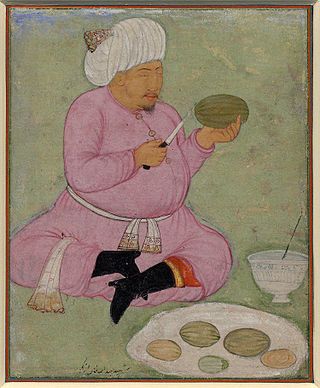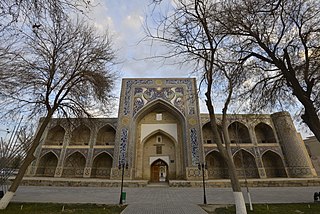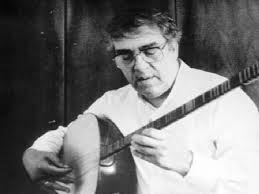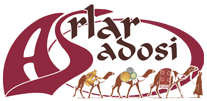Biography
Babakhanov was born in Bukhara into a Jewish family which can look back on an outstanding dynasty of traditional musicians. It was founded by his grandfather Levi Babakhan (1873–1926), the legendary court vocalist of Alim Khan, the last emir of Bukhara. Levi Babakhan's son Moshe Babakhanov (1910–1983) was also a famous vocalist who accompanied himself on tanbur and doira.
In contrary to his grandfather and father Ari Babakhanov became a pure instrumentalist. After his musical studies according to the European curriculum at the Tashkent conservatory he graduated in 1959 with the state examination. Because of the Soviet cultural politics using the customary instruments was still permitted but mainly for a European repertoire. By the discrepancy between the monophonic Uzbek music and the European polyphony this constraints led to an artificial cultural hybrid.
In spite of his artistic successes in Tashkent Ari Babakhanov returned to Bukhara, where he taught for the following 40 years at the music college. With the help of his father and musicians like Maarufjon Tashpulov, Najmiddin Nasriddinov und Aminjon Ismatov he gradually found back to the traditional Bukhara music, the Shashmaqam. He made it his life task to develop this art and achieved a unique contribution for keeping it by writing down an enormous number of notes and texts of Persian Poetry as well as popular Uzbek and Tajik poems. Hereby he revived a series of lost creations which had formerly belonged to the Shashmaqam repertoire. This basis inspired him to compose own instrumental pieces and songs in the traditional style of which several became very popular in Uzbekistan.
In 1991 he founded at the Bukhara Philharmonic Society the Shashmaqam Ensemble which grew within a few years from initially 10 to 19 members. Shortly afterwards the group under the artistic direction of Ari Babakhanov performed for the Uzbek radio and TV and established itself in the traditional music scene. In 1998 their CD Ari Babakhanov & Ensemble - Shashmaqam: The Tradition of Bukhara was published by New Samarkand Records.
Because the Bukharian Jewish community of Central Asia has almost dispersed by migration after Uzbekistan's independence Ari Babakhanov's family searched for new future perspectives and moved to Germany where he collaborates with the musicologist Dr. Angelika Jung in a Shashmaqam research project since 2002.

Uzbekistan, officially the Republic of Uzbekistan, is a doubly landlocked country located in Central Asia. It is surrounded by five countries: Kazakhstan to the north, Kyrgyzstan to the northeast, Tajikistan to the southeast, Afghanistan to the south, and Turkmenistan to the southwest, making it one of only two doubly landlocked countries on Earth, the other being Liechtenstein. Uzbekistan is part of the Turkic world, as well as a member of the Organization of Turkic States. Uzbek, spoken by the Uzbek people, is the official language and spoken by the majority of its inhabitants, while Russian and Tajik are significant minority languages. Islam is the predominant religion, and most Uzbeks are Sunni Muslims.

Samarkand or Samarqand is a city in southeastern Uzbekistan and among the oldest continuously inhabited cities in Central Asia. Samarkand is the capital of Samarqand Region and a district-level city, that includes the urban-type settlements Kimyogarlar, Farhod and Khishrav. With 551,700 inhabitants (2021), it is the third-largest city in Uzbekistan.

Tashkent, also known as Toshkent, is the capital and largest city of Uzbekistan. It is the most populous city in Central Asia, with a population of more than 3 million people as of April 1st 2024. It is located in northeastern Uzbekistan, near the border with Kazakhstan.

Bukhara is the seventh-largest city in Uzbekistan by population, with 280,187 residents as of 1 January 2020. It is the capital of Bukhara Region.
The music of Uzbekistan has reflected the diverse influences that have shaped the country. It is very similar to the music of the Middle East and is characterized by complicated rhythms and meters. Because of the long history of music in the country and the large variety of music styles and musical instruments, Uzbekistan is often regarded as one of the most musically diverse countries in Central Asia.

Bukharan Jews, in modern times called Bukharian Jews, are the Mizrahi Jewish sub-group of Central Asia that traditionally spoke Bukharian, a Judeo-Persian language most similar to the Tajik dialect of Farsi. Their name comes from the former Muslim-Uzbek polity Emirate of Bukhara which once had a sizable Jewish population. The vast majority lived in modern-day Uzbekistan and Tajikistan, with small groups in Kyrgyzstan, Turkmenistan, and Afghanistan.

Abdullah Khan, known as "The Old Khan", was an Uzbek ruler of the Khanate of Bukhara (1500–1785). He was the last uncontested Shaybanid Khan of Bukhara from 1583 until his death.
The culture of Uzbekistan has a wide mix of ethnic groups and cultures, with the Uzbeks being the majority group. In 1995, about 71.5% of Uzbekistan's population was Uzbek. The chief minority groups were Russians (8.4%), Tajiks, Kazaks (4.1%), Tatars (2.4%), and Karakalpaks (2.1%), and other minority groups include Armenians and Koryo-saram. It is said however that the number of non-indigenous people living in Uzbekistan is decreasing as Russians and other minority groups slowly leave and Uzbeks return from other parts of the former Soviet Union.

Lab-i Hauz, sometimes also known as Lyab-i Khauz, a Russian approximation, is the name of the area surrounding one of the few remaining hauz pools that have survived in the city of Bukhara, Uzbekistan. Until the Soviet period, there were many such pools, which were the city's principal source of water, but they were notorious for spreading disease and were mostly filled in during the 1920s and 1930s.

Gavriel Aronovich Mullokandov is regarded as the greatest Bukharian Jewish singer and musician. He was the People's Artist of Uzbekistan.
Ziyodullo Shahidi was a Tajik musician and father of Persian Symphonic Music in Tajikistan.
Shoista Mullojonova, born Shushana Rubinovna Mullodzhanova, was a renowned Bukharian Jewish Shashmaqam singer.
Barno Iskhakova was a Soviet and Bukharian Jewish musician from Tajikistan.

Shashmaqom is a Central Asian musical genre which may have developed in the city of Bukhara. Shashmaqam means the six Maqams (modes) in the Persian language, dastgah being the name for Persian modes, and maqams being the name for modes more generally.

Necdet Yaşar was a Turkish tanbur lute player and teacher. A founding member of the Istanbul State Turkish Music Ensemble, he performed throughout the world as a cultural ambassador for Turkey and taught twice at the University of Washington (USA). In 1991, the Turkish government awarded him the title of "National Artist".
Turgun Alimatov was a leading Uzbek classic music and shashmaqam player and composer of 20th century folk and classic music. He was a master performer of tanbur, dutar, and sato. He was recognized as People's artist of Uzbekistan.
Ilyas Malayev was a musician and poet.

"Asrlar Sadosi" was a festival of traditional Uzbek culture which attracts tens of thousands of local and overseas tourists every year and presents all the diversity of the national traditions and customs, handicrafts and cuisine, unique oral and non-material heritage. Asrlar Sadosi was annually organised by The Fund Forum of Culture and Arts of Uzbekistan since 2008, in association with UNESCO since 2009.

The National Television and Radio Company of Uzbekistan is the national broadcaster of Uzbekistan, operating four television networks.
Isohor Xaimovich Oqilov was a Soviet artist, dancer, ballet master, choreographer and a People's Artist of the Uzbek SSR (1970). He was also a recipient of the State Hamza Prize.











